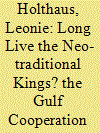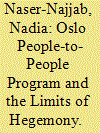|
|
|
Sort Order |
|
|
|
Items / Page
|
|
|
|
|
|
|
| Srl | Item |
| 1 |
ID:
169255


|
|
|
|
|
| Summary/Abstract |
This article undertakes a filmic and cultural analysis of representations of migrant domestic work in Lebanon, with reference to Sara Ahmed’s theorization of the sociality of emotions. It focuses on documentaries, TV programs and news bulletins featuring migrant domestic workers (MDWs). These representations bring to bear intensely emotional situations that capitalize on conflict, loss, and attachment. According to Sara Ahmed, emotions are social and cultural practices that shape individual and collective bodies and legitimize political decisions. In this article, we look at the ways in which the mise-en-scène of encounters involving MDWs, their employers, and other agents, provide for viewers emotional scripts that legitimize certain political positions. We suggest that these mise-en-scène encounters shape domestic work as a site of abuse perpetrated by ‘bad’ employers, as a site of horror inhabited by ‘tragic’ victims, and as a site of loving relations performed by ‘good’ employers. In doing so, we argue that they inflate the privatized and sensationalized dimensions of domestic work and depoliticize this field of labor. The exception to this trend is the documentary A Maid for Each that unflinchingly addresses the moral bankruptcy of Lebanon’s migration and labor regimes.
|
|
|
|
|
|
|
|
|
|
|
|
|
|
|
|
| 2 |
ID:
169257


|
|
|
|
|
| Summary/Abstract |
Religious knowledge is at the heart of the Shiʿi system of clerical authority known as the marjaʿiyya. Given the multiplicity of more or less well-established claimants to the position, this article explores the scholarly credentials of the contemporary marjaʿ[source of emulation; pl. marājiʿ]. I conceptualize the marjaʿiyya in accordance with Pierre Bourdieu’s notion of the field in order to examine how scholarly capital is defined, and possibly redefined, by 14 religious scholars competing in this marjaʿiyya field in Iraq. To do so, I use their ‘official’ biographies in Arabic and analyze the types of credentials of scholarly capital that are put forth to legitimate the claims of these marājiʿ. I argue that, despite the multiplicity and diversity of contenders, there is a fair degree of homogeneity in the ways scholarly capital is defined. In the biographies, the marājiʿ’s scholarly capital is validated against three broad indicators: their inherited scholarly capital, which stems from their family background; their educational capital; and the intellectual-scientific prestige capital derived from their scholarly and teaching activities. The credentials emphasized in the different biographies are generally much alike, and if a marjaʿ does not satisfy them, ‘almost-like’ credentials are constructed. Abidance to shared codes and practices reflects, as well as contributes to, the stability of the marjaʿiyya field.
|
|
|
|
|
|
|
|
|
|
|
|
|
|
|
|
| 3 |
ID:
169254


|
|
|
|
|
| Summary/Abstract |
This article revisits prevailing ideas about the legitimation of monarchical rule through the Gulf Cooperation Council (GCC) by emphasizing the neo-traditional rule of the GCC regimes. It assumes that legitimacy claims often cross the local, national and (sub-)regional levels and analyzes them from a critical historical perspective and against the background of a global capitalist order. I show that the history of the sub-regional organization is wedded to legitimacy claims, referring to a common Gulf identity and good economic performance for the benefit of the members’ citizens. However, I focus on what often is marginalized in scholarly analyses: The common normalization of highly segregated labor markets on which the neo-traditional regimes depend. In effect, I criticize not only the international failures to oppose the GCC’s common repression of democratic revolt (2011). I also depict a bias in many scholarly analyses of autocratic legitimacy, as they neglect citizen-foreigner gaps. Finally, I argue that geopolitical and elite competition, as evident in the tensions between Saudi Arabia and Qatar, does not prepare the end of the GCC as we know it. Only substantive democratization could do so.
|
|
|
|
|
|
|
|
|
|
|
|
|
|
|
|
| 4 |
ID:
169256


|
|
|
|
|
| Summary/Abstract |
Reconciliation-based initiatives evoke a substantive and meaningful vision of peace and suggest a form of peace building that is intimately engaged at the personal and social level. This article critically engages with a specific reconciliation initiative, the People-to-People Program (P2PP) that was applied to the Palestinian-Israeli conflict. It uses Gramscian concepts of hegemony, consent, and war of position, with the intention of illustrating that the program functioned as a disciplinary or regulatory device that structured and realigned the agency of its Palestinian participants. In highlighting the different features and dimensions of Palestinian subversion and resistance, it brings out the limits of hegemony.
|
|
|
|
|
|
|
|
|
|
|
|
|
|
|
|
| 5 |
ID:
169253


|
|
|
|
|
| Summary/Abstract |
Whereas in other MENA countries the impact of neo-liberal policies has been the subject of intense debate, there are at present few voices that directly analyze or critique its social and political consequences in Iran. This article seeks to address this lacuna by analyzing the dynamics of reformism, economic liberalization and popular mobilization in Iran. It charts the country’s move from a post-revolutionary populism to a liberalized yet increasingly exclusivist model of politics and compares this to trajectories of economic liberalization in Egypt. Two distinct outcomes of economic reform are analyzed in the first part of the article: Socioeconomic exclusion; and the contraction of political rights. In the second half, I investigate the ways successive postwar governments in Iran have packaged neoliberal reforms, and how their reimagining of the role of the state has led to differing levels of popular resistance. Finally I argue that under the present administration, political elites increasingly are oriented toward strengthening the state and seeking to limit opposition to their policies. However, the absence of neoliberal hegemony in Iran means that growing mobilization on socioeconomic issues is challenging these policies. The Right in Iranian politics is utilizing this mobilization to present a populist challenge to the reformists in power.
|
|
|
|
|
|
|
|
|
|
|
|
|
|
|
|
|
|
|
|
|